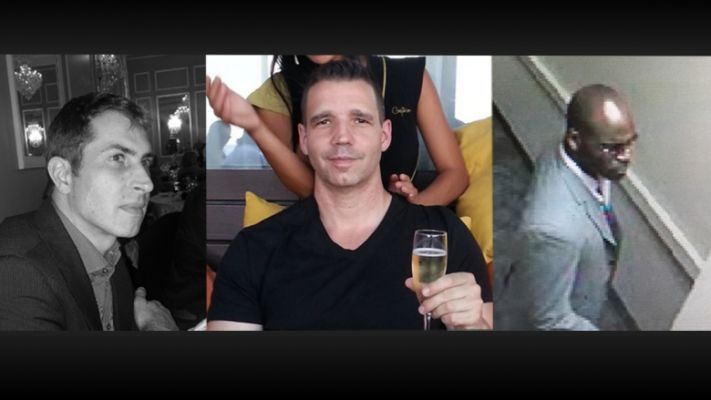Owners and property managers at several downtown condominium buildings are accusing a group of individuals of hijacking their boards of directors to get control of multi-million dollar budgets and reserve funds.
CBC Toronto has linked a group, made up of three men and some associates, to condo boards in about a dozen highrises in Toronto and Mississauga over the last several years.
In many of these cases, the individuals controlling the boards don't appear to own units in the building.
"We're certainly aware of a half-dozen buildings where attempts have been made by this group to take control of the board of directors," said Audrey Loeb, a lawyer with Miller Thomson who specializes in condominium cases.
The CBC investigation uncovered allegations of "forged signatures," irregularities in the election of members to the boards and even the suggestion that a board member at one Toronto condo doesn't really exist.
Ontario's Condominium Act has very few restrictions on who can be elected to a condo board. Loeb says as long as one is over 18 years of age, mentally competent and not bankrupt, almost anyone can be on the board. The elected board members then make decisions — including setting rules and overseeing financial operations — on behalf of condo owners, who pay monthly fees to the board.
However, under provincial rules, elected board members don't have to own a unit in the building.
Some residents in the buildings where the three men have been elected to the board complain the boards haven't allowed them to attend meetings, won't reveal information about how service contracts were awarded and allege that their buildings have fallen into physical and financial disrepair on the men's watch.
"I have to wonder why they're running for the board of directors," Loeb said. "They're not getting paid, but they're in control of significant amounts of money."
Who are the 3 men seeking spots on boards?
The group identified by CBC Toronto as taking aggressive steps to control condo boards in the city involves three main characters:
George Laczko: The co-founder of a Danforth Avenue immigration company and web-based businesses that has been the subject of dozens of complaints in the past year about its business practices from irate customers. Laczko currently sits on two condo boards in buildings where he is not a registered owner. He tried to get on a third condo board in January.
Ray Blanchard: A self-described restaurant owner and investor. In the past year alone, Blanchard has been elected to at least three different condo boards. He tried to get on a fourth. Land registry records show he is not a registered condo owner in any of the buildings he helps control.
Darryl McGregor: The director of Perfect Clarity Inc., a Toronto-based energy management firm. McGregor has had several run-ins with police. He currently sits on at least two condo boards in buildings where he owns units and has launched a court battle to get back on the board of the Icon condo building at 270 Wellington St. W., where he also owns a unit. McGregor was convicted in 2013 of breaking into a unit at Icon and stealing items belonging to a resident.
Identity fraud allegations
In each of the cases CBC Toronto investigated, the new boards have terminated the contracts of property managers, cleaners and security staff and other providers of building services.
The boards have signed new contracts with other service providers. In some cases, they also signed energy contracts through Perfect Clarity, the energy management firm directed by McGregor
McGregor, Blanchard and Laczko would not answer questions directly or through their lawyers.
Last month, a group of residents at the Icon condo building in downtown Toronto filed a complaint with Toronto Police. They allege that during their board of directors elections last December, McGregor submitted more than a dozen proxy ballots containing "forged signatures" of condo owners.
Proxy votes are used when an owner of a condo can't cast a vote in person and signs their vote over to someone else, who casts a ballot on their behalf.
CBC Toronto has learned some of the condo owners who claim their signatures were forged have provided sworn affidavits to police. The investigation into the forgery allegation is ongoing.
Ray Chepesiuk, who lives in Icon, told CBC Toronto it wasn't until after the condo board election "that the property manager noticed that some of the signatures didn't line up with some of the signatures we had on file on legal documents. Our lawyer told us this was serious."
McGregor was then kicked off the board.
The businessman is now suing the condo corporation and unit owners, claiming they had no authority to remove him from the board.
In his affidavit filed in court, McGregor claims the election results were final and that he "has denied and continues to deny any knowledge of or involvement with any forged proxies."
The legal matter has yet to be settled in court.
Men 'acted like they didn't know each other'
The Icon case is not the only instance where the three men turned to the courts to sue condo owners at buildings where they've been turfed over allegations of improper proxies.
On July 27, 2016, McGregor, Laczko and Blanchard were elected to the five-member condo board at the luxury Five condo building at 5 St. Joseph St. The 48-storey tower has over 500 condos and an annual operating budget of about $2.6 million, plus a reserve fund.
According to court documents and interviews with witnesses, the three men arrived at the election meeting —called a turnover meeting — and explained why they wanted on the board. All three claimed to own units in the building.
"They all sat in different parts of the room, and none of them talked to each other," one person who was at the meeting told CBC Toronto.
A second person in attendance said, "they acted like they didn't know each other."
Laczko said if elected, he would push for security upgrades because his girlfriend had been accosted while coming home one night.
Blanchard described himself as a former restaurant owner. He also said he wanted to nominate a woman he had recently met in the building for a spot on the board. Her name was Jennifer Chang.
McGregor is said to have become testy when asked about his professional life.
All three men won seats on the condo board that night by wide margins. Chang did not.
Proxy problem?
The election was won in part thanks to the 53 proxy votes Blanchard had submitted — apparently signed by absentee owners.
The next day, residents in the building say, they found out all three men supposedly owned the same 13th floor unit, and Chang was Laczko's girlfriend.
Land registry records also showed McGregor was the only registered owner on title for the condo.
Days later, the proxies submitted by Blanchard were checked more closely: 34 were blank. In other words, the proxies didn't identify which candidate the absentee voters wanted to vote for. Blanchard was allowed to vote on their behalf for whoever he wanted to.
The property managers of Five eventually claimed the proxies hadn't been filled out properly and voided the election results.
Blanchard, McGregor and Laczko launched a court challenge under Ontario's Condominium Act to regain their spots on the board and won.
On Aug. 31, 2016, Ontario Superior Court Justice Freya Kristjanson ruled the property manager had no legal authority to nullify the election and the proxy issues were raised after the fact.
Kristjanson ruled a second election should be held and in the meantime, ordered the interim board not to make significant financial decisions involving the condo tower. They seemingly ignored that court order and fired the property management company.
In court documents, the men allege they had fired the same company at another condo board they were elected to and believed the company wanted to prevent the three from getting on the board of Five as well.
The property management company did not respond to questions from CBC Toronto.
2nd election, 2nd win
The three men submitted 200 proxies at the second election at Five and won again. Also elected to the board was condo owner Elena Lokchina, who later resigned in apparent frustration. Someone named Sam Cheng was elected to the fifth spot on the board.
Cheng didn't actually show up for the election. Instead, his bio was passed around to condo owners. In it, Cheng claimed he had "been involved in over $600 million of real estate transactions." He also claimed to "lead the acquisitions team" at a major Toronto real estate investment firm.
CBC Toronto tried to make contact with Cheng, but the firm listed in his bio said they had never heard of Cheng.
Two condo owners at Five say none of the dozens of owners they canvassed had ever seen Cheng.
"I think it's unbelievable ... we have no idea who he is," said one owner. "We don't even know if he exists."
Residents at Five also say maintenance fees went up slightly recently despite "lots of operational issues," such as late or no snow ploughing last winter and elevators and garbage chutes that are routinely out of service. They have also complained about theft in the building.

